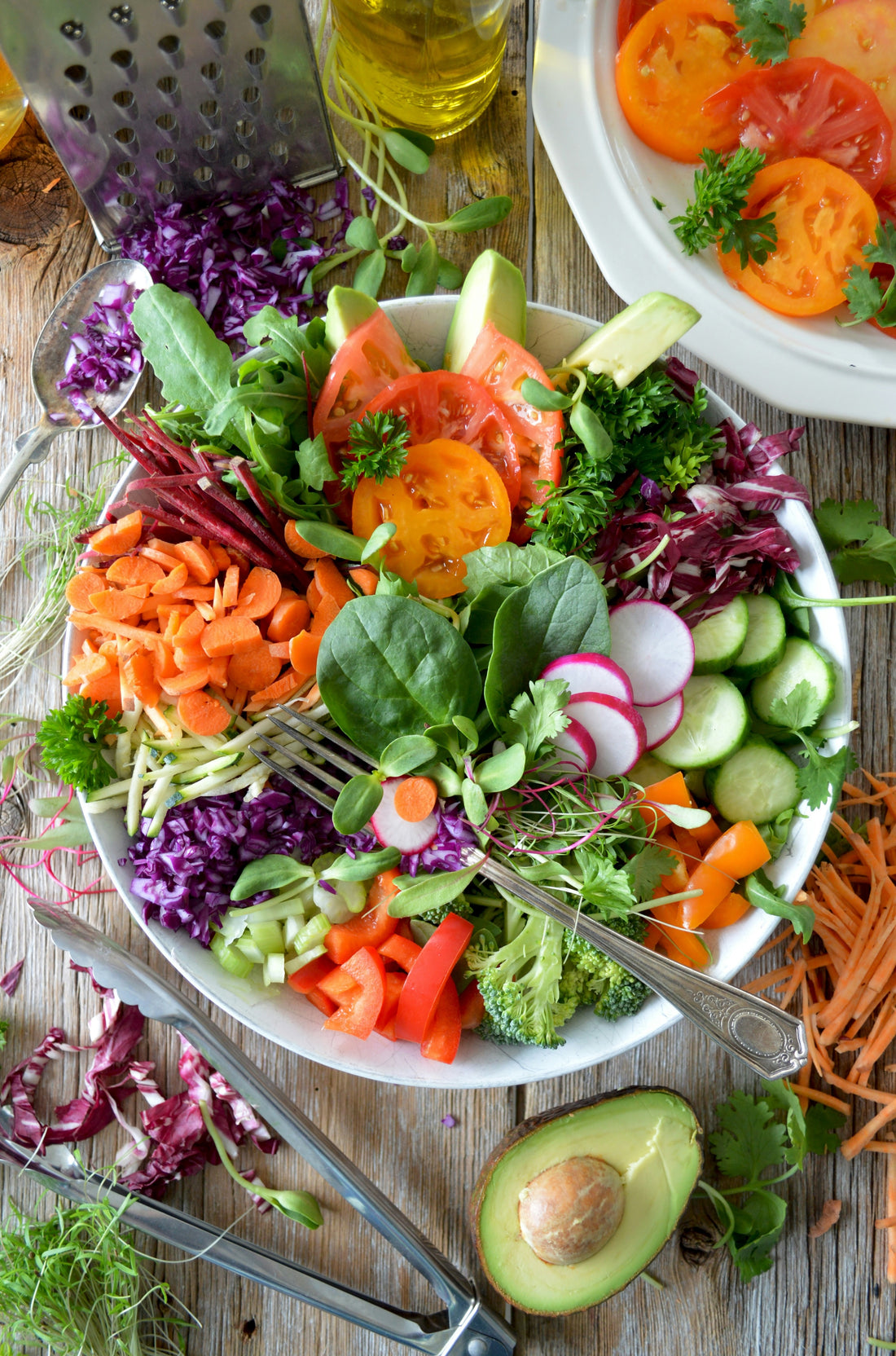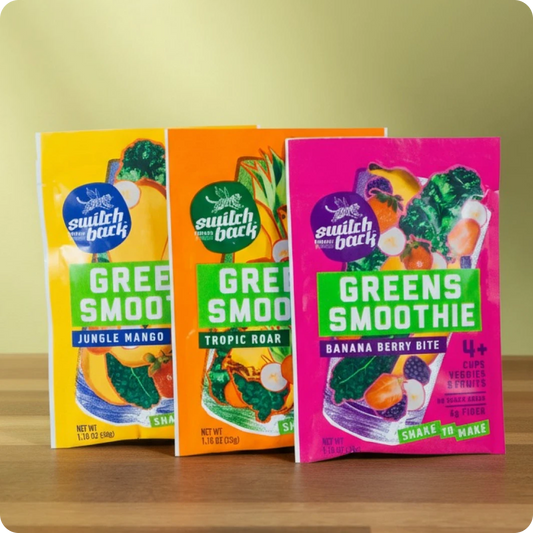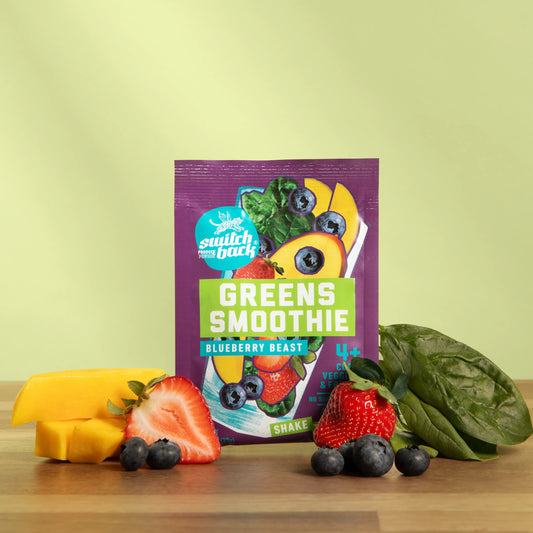
Gut Healers | Gut Health
Gut Healers
Gut health has received more attention in the past few years (thanks Covid!) and is now one of the most sought after questions in the medical community. How do I know if I have poor gut health and how does that lead to poor digestive health? There are plenty of myths around gut health and some of those are downright lies. We are going to break down all things gut health for you and help simplify something in a world of chaos and fear. Rest assured, you can heal your gut and possibly solve some food intolerances with a few easy changes to your diet.
What is my gut?
Did you know that the term “gut” isn’t a scientific term? The word gut has become the catch all for your bodies gastrointestinal tract. Had my wife not worked at a GI clinic for a few years, I would have never known this until I turned to google of course. The gut consists of a few major parts of your body:
- Mouth - where your food is mashed and chewed and saliva helps start digesting it immediately.
- Esophagus - The tube that connects your through to your stomach
- Stomach - This is the sac that acts as the warehouse for your undigested food until your body as mixed and moved it. Digestive enzymes begin to break down the food here.
- Small intestine - The largest and longest part of your GI system. This is where digestive juices from the pancreas and liver work together and the nutrients are absorbed in the blood stream through the intestinal walls.
- Large intestine or colon- this section absorbs water and electrolytes from the remaining mixture forming a stool. Waste is stored her until you poop it out.
So, as you can see, gut health is a major part of your body! Every single thing eaten has to go through this tract.
What is My Gut Microbiome?
Your gut is powerful and magical, to say the least. According to most research, there are trillions of microorganisms living in your gut which make up the gut microbiome. The gut microbiome aids in functions like digestion, nutrient absorption, immune system, and brain health. Yes, we said brain health and mental health.
How does my gut health impact digestion?
The gut microbiome helps break down complex carbohydrates and produces certain vitamins. This leads to a healthy gut microbiome and one that your body will thank you for! Gut health is vital for this part of the process!
How does gut health impact nutrient absorption?
A healthy gut will absorb nutrients properly if it has good gut bacteria. Unfortunately, as we will see later, much of these depends on ultra processed foods as your primary source of nutrients or raw, whole foods.
Immune System - How is it part of gut health?
A healthy gut microbiome interacts with the immune system (so too does an unhealthy one) and helps to ward off pathogens like the flu and colds as well as the regulation of inflammation.
Brain and mental health tie into gut health?
Research from suggests there may be a link between the gut microbiome and brain function that impacts cognitive decline, mood, and mental health. WOW!
Do fermented foods help gut health?
Probiotic foods that have been fermented have been changed because the naturally occurring bacteria or yeasts break down the sugars and starches. This process can created byproducts that give fermented foods their flavor and preservation.
A few fermented foods that are known to help gut health and gut micribiota are: Yogurt, Sauerkraut, and kombucha. These items are shown to increase beneficial gut bacteria by introducing new beneficial bacteria strains to your gut. This promotes a diverse and healthy gut microbiome.
Fermentation also creates organic acids, namely lactic acid, which can prevent harmful bacterial while promoting the growth of good bacteria leading to a healthy gut. Improved digestion is another benefit of fermented foods as some of them have digestive enzymes that aid in gut function and help ease digestive discomfort. Some of the fermented foods also have immune system benefits and help ward off pathogens and finally, all of this helps lead to reduced inflammation!
Not all fermented foods are the same, nor do they all carry the same gut health benefit. Focus on live and active culture with minimal added sugar. Also, please don’t make the same mistake our founder go “all in” on Kombucha only to find out the side effects of too much!
Healthy Bacteria? How Do I get more?
Healthy bacteria is imperative in preventing inflammatory bowel disease. Inflammatory bowel disease is most commonly associated with an overactive immune system that attacks the gut lining. Healthy bacteria can prevent this response and potentially mitigating the severity of IBD. An unhealthy gut doesn’t have a proper barrier which allows bacteria and harmful substances from entering the bloodstream. Maintaining a diverse microbiome, with balance, is key for gut health and reducing IBD risks.
Gut Microbiota - What is it?
Okay, we get it, that word can scare you! What is it? Well, simply put it is a fancy word for the gut microbiome! Why they need to have different terms, well, we won’t ever know. The gut microbiota, which might be something those with a healthy gut microbiome say to sound smarter is the same thing - so don’t let it scare you.
How do I improve my microbiome / gut Microbiota?
The good news is that while your overall health is extremely connected to your gut health, you can improve your gut health with a few simple changes. Of course, consult a physician for further advice. You can make lifestyle and diet changes that are simple and easy.
- Fiber rich foods. Prebiotic foods, which are naturally rich in fiber, are a great way to feed and nourish gut bacteria.
- Fermented foods - we have covered this, however a healthy microbiome relies on fermented foods.
- Limit ultra processed and processed foods. Both the ultra processed foods and processed foods generally lack the fiber needed to support gut health.
- Eat prebiotics. Some great prebiotics are garlic, bananas, and whole grains.
- Hydration - To have a healthy body and gut water consumption is an absolute must as it aids in digestion and absorption of nutrients.
- Relieve stress - It is shown to cause gut health issues and can disrupt gut bacteria. Things like yoga, exercise or meditation all work well.
- Getting enough sleep is critical as well. Sleeping 7-9 hours a night is important as deprivation can have a negative impact on your gut microbiota.
- Gut health can be impacted positively or negatively through exercise. Physical activity is wonderous for your digestive system and gut health so make this a priority.
- Probiotic supplements may aid in improving gut health, however please consult a doctor on this.
Remember, if you are taking on a new food, particularly fermented or high fiber, please be cautious of food allergies as well as food sensitivities. Certain foods can cause intestinal inflammation. For a solid gut microbiome, don’t forget oral health! Studies have shown proper oral care can prevent harmful bacteria from entering your GI tract. Digestive health isn’t just about the food you eat! Professional guidance is a must. If you are looking for probiotic and prebiotic foods or supplements, consult a doctor or registered dietician.
Is Leaky Gut Real?
Leaky gut is not a medical diagnosis. It is imperative to understand that and as such there is no medical cure. It is when your develop intestinal permeability allowing toxins and bacteria to readily flow, or more easily flow, from your gut to your blood stream. While intestinal permeability is not a diagnosed medical condition, please consult a doctor to learn more. If you believe you have it, some of the symptoms are food sensitivity, bloating, upset stomach, skin health problems, and fatigue. It is thought that diets with artificial sweeteners, low fiber, stress, and processed foods can contribute to this.probiotics and probiotics if needed. Plant foods are the dominant source of natures prebiotics and if you ead a diet rich in fiber, you naturally are rich in prebiotics . Probiotics, however, as we covered early are a bit tougher to find. They mainly consist of foods rich in fermentation.
Is an anti inflammatory diet for me?
An anti inflammatory diet for gut health will be rich in foods that promote gut microbiota and are easy on the digestive tract. Eat foods like fruits and vegetables, fatty fish, healthy fats, whole grains legumes, yogurt and spices to reduce and inflamed gut. Almost all of these are gut healthy foods and are packed with either fiber, antioxidants, vitamins, healthy fats and more.
Your digestive tract will thank you for these foods, and your overall gut health will improve, but that makes sense considering these are natural and rarely processed foods. An unhealthy gut can be a result of not consuming these foods and focusing on highly processed foods. One sign you may need to change your diet is if you have food intolerances as it stands today. That may be a sign you have an unhealthy gut microbiome and are in need of changes to a more natural, unprocessed diet.
To make your gut microbiome healthier and heal your gut, limit the following foods; refined carbohydrates, red meat and processed red meats, saturated and trans fats, sugar, artificial sweeteners, and alcohol. These are all known to possibly inflame your gut, let alone the possibility of leading to cardiovascular disease, irritable bowel syndrome, and gastrointestinal disorders.
Chewing slowly for gut health, something to chew on.
To improve your get health, did you know that if you eat slowly chewing you can have an immense impact? It leads to improved digestion can reduce digestive discomfort because it breaks your food down into small pieces. This leads to better absorption of nutrients and can alleviate many of the gut issues people face like gas, constipation and bloating.
When you eat slowly, you also have increased fullness, or satiety. This is important for your physical health as it send signals to your brain that you are full which in turn leads to less food eaten. In the long run your physical health is better because you don’t consume excess calories and stress out your gut. Who would have thought that eating slowly could increase whole body health?
Enhanced gut health / gut microbiome is another positive impact of eating slowly! Slower eating can increase beneficial bacteria in your gut. Chewing and saliva release nitric oxide which is a critical part of your gut health. Chewing also allows for more thorough fermentation by gut bacteria leading to better gut health.
A few others - reduced stress and mindful eating are both critical to gut health and gut healing. Further research needs to be done on many of these points as this is a relatively new and important part of overall health.
Myths in Gut Health
- I can do a cleanse to improve gut health: You cannot, ever, never ever, cleanse your gut no supplement, pill detox or cleanse can do this. Probiotic supplements cannot and will not cleanse you. Your colon is the only thing that can cleanse or detox your body and heal your gut. Colon cleanses can destroy or alter your healthy gut bacteria and cause long term damage, including but not limited to leaky gut syndrome and harmful digestive symptoms such as constipation, diarrhea and nutrient deficiency.
- Probiotics will solve my issues: Probiotic supplements are not a cure for gut health. Your gut microbiota is incredibly powerful and strong, thus you can have a small impact with supplements, however they will not solve your issues unto themselves. They do offer benefits for gut health and digestive tract issues, however do not be misled to believe they will cure you.
- Gluten is bad for my gut. Your gut naturally knows how to process gluten unless you have celiac disease or a gluten intolerance. Cutting out gluten without evidence of an intolerance is not a recipe to improve your gut health.
- You need to eliminate food groups to improve gut health: Food sensitivities have many causes, many of which have another underling issue. Variety is important and focusing on a diet rich in plants and healthy fats can improve your overall health and improve a healthy microbiome.
- I can shortcut my diet with yogurt and kombucha foods. Not true. There is no shortcut to the benefits of a healthy, well balanced diet. Focusing solely on short cuts will not lead to a healthier gut.
- Superfoods are a quick fix for my gut: For your own mental health, it is important to not rely on why influencers have told you about superfoods. One single superfood, or supplement, is not enough to improve gut health. Ahealthy gut microbiome consists of a variety of foods.
- Stress doesn’t impact my gut: Research has shown that chronic stress negatively impacts the gut microbiome and can lead to long term issues from food intolerances to immune system disorders.
- All yogurt is good for me: Well, technically that depends on what you are going for. If you are looking for yogurt to help your digestive system and gut health, focus on yogurt with life and active cultures as this is where the probiotic benefits originate from. It should have Lactobacillus and Bifidobacterium.
- Antibiotics will destroy by gut microbiome forever: While it will temporarily impact healthy gut bacteria, having a healthy diet and taking probiotics will restore it over time.
- My poop is an indicator of gut health: Well, sort of. Most likely not as your poops will change and it is normal to have that. If you have consistent diarrhea, constipation or blood, consult a doctor immediately.
Immunity - what is it?
The connection between your immune system and gut health is incredibly strong and complex. Your gut, home to trillions of bacteria, fungi, and viruses, forms a unique ecosystem called the gut microbiome. This microbiome plays a critical role. Here's how:
- Training Ground for Immune Cells:
- Over 70% of your immunity system resides in your gut! This includes various immune cells that learn to distinguish between harmless "residents" and harmful pathogens in the gut. This training helps ensure a balanced and appropriate response throughout the body.
- Barrier Function:
- Your gut lining acts as a barrier, preventing harmful substances and pathogens from entering the bloodstream.The gut microbiome contributes to this barrier function by supporting the production of mucus and tight junctions between gut cells.
- Inflammation Regulation:
- The gut microbiome can influence the production of inflammatory mediators. A healthy gut microbiome promotes a balanced inflammatory response, while disruptions can lead to chronic inflammation, potentially triggering autoimmune diseases and other health problems.
- Nutrient Absorption:
- The gut microbiome plays a crucial role in breaking down food and absorbing essential nutrients. These nutrients fuel your immune cells and support their proper function.
- Communication Channels:
- The gut and immune system constantly communicate through various pathways, including the production of hormones and immune molecules. This ensures coordinated responses to challenges like infections and allergies.
Supporting both Gut Health:
Here are some strategies to nurture both your gut microbiome and immune system:
- Eat a balanced diet: Prioritize fruits, vegetables, whole grains, and lean protein sources. Limit processed foods,sugary drinks, and excessive saturated and trans fats.
- Healthy foods: Yogurt, kefir, kimchi, and sauerkraut contain beneficial probiotic bacteria that can support gut health.
- Manage stress: Chronic stress can disrupt gut health and weaken your immune system. Practice relaxation techniques like yoga, meditation, or deep breathing.
- Get enough sleep: Adequate sleep is essential for overall health, including immune function and gut microbiome balance.
- Consider probiotics: Consult a healthcare professional about whether probiotic supplements might benefit your specific needs.
- Stay hydrated: Drinking plenty of water aids digestion, nutrient absorption, and overall well-being.
Inflammatory Foods For Gut:
Refined carbs, red meat, processed meats, added sugars and sugared beverages, and fried foods are all to be avoided for excellent gut health. These are to be reduced or avoided for gut health. Many of these can lead to irritable bowel syndrome flare ups.
Summary:
Gut health is not something that you can have a shortcut to, nor do supplements really help. Your gut naturally wants to work in your favor, yet we often do harm to our bodies base on what we eat. If you want to improve your gut health, focus on whole, plant foods. Gut healing is another often sought after term and many people will point you towards things with no scientific backing so please be careful and research what people are suggesting.
Foods rich in fiber, vitamins, and minerals that are naturally occurring will yield optimal gut health. Human health relies heavily on the health of our gut and our gut naturally wants to protect us. Remember that our gut naturally loves whole, natural foods and will reward you with better outcomes. Mental health and human health rely on foods rich in these things.
Gut health is incredibly important and is something that you need to take seriously for the long run of your health and wellbeing. Remember, gut microbiota and gut microbiome are the same thing and that you don’t need to take an absurd amount of supplements to heal your gut. Your digestive system will thank you for eating a diet rich in fiber and natural vitamins and minerals. I hope your overall health can be improved and you continue to take the small steps needed to have amazing gut health in the long run!




